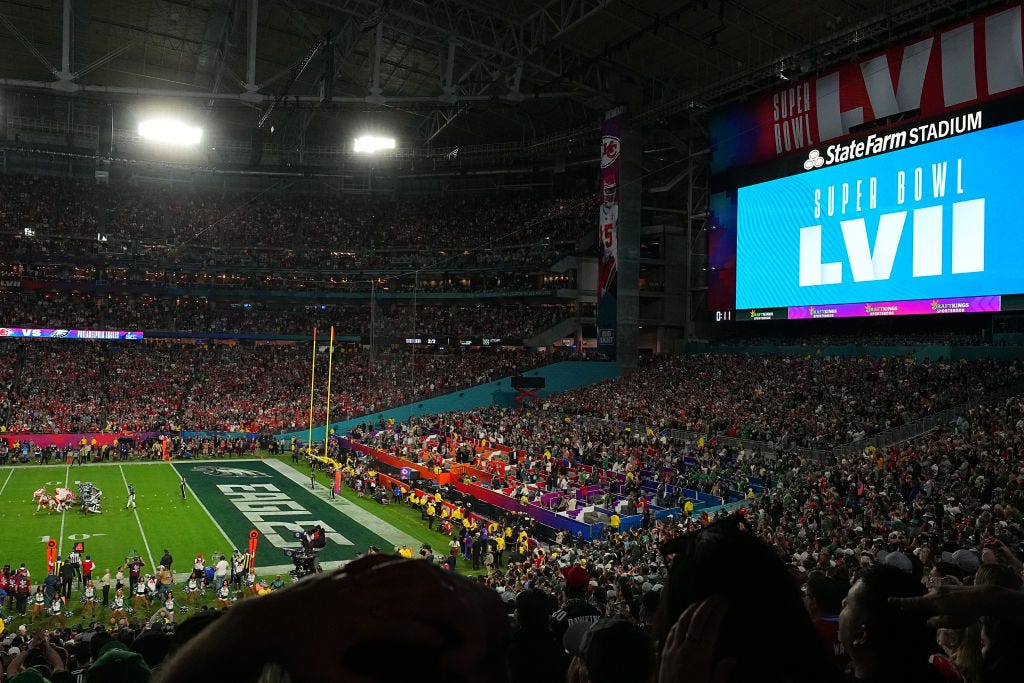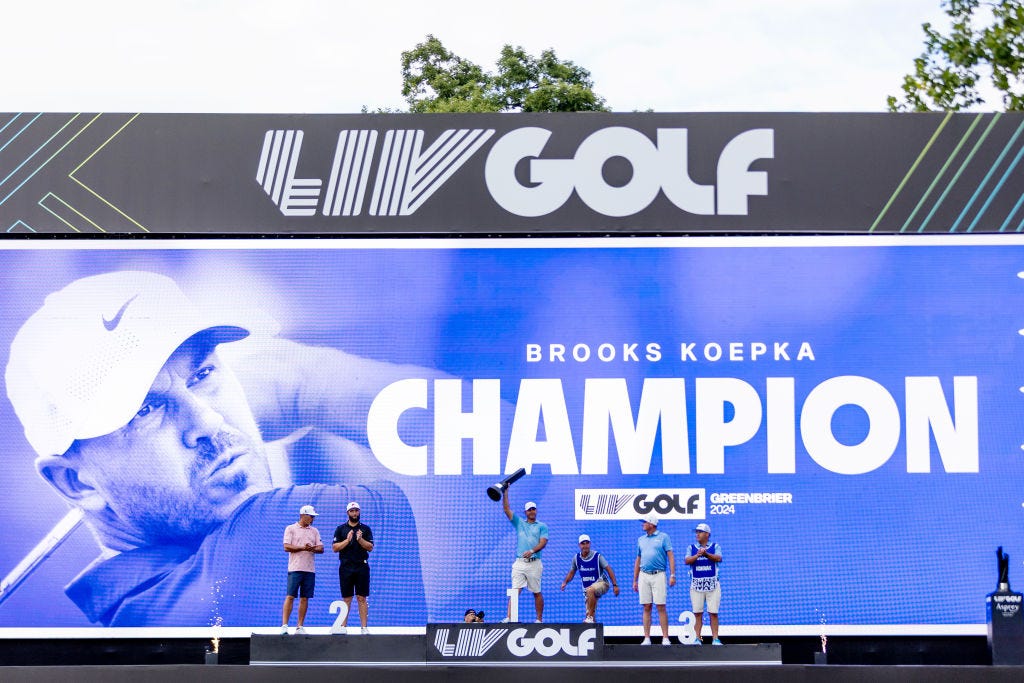The NFL and Private Equity: Barbarians at the Goal Line?
The NFL approved a plan that would allow select private equity firms to purchase up to ten percent non-governing stake. Is this business as usual, or something to be genuinely concerned about?
NFL owners approved a rule change that allowed select private equity firms to purchase ownership shares of up to ten percent of an NFL franchise, an ownership structure shift that is both remarkably radical and extremely normal.
For the NFL, it’s fairly radical. They’ve been slow to approve changes in the structure of ownership for NFL teams compared to other leagues and not too long ago were committed to a policy that required a lead investor (or lead investor’s family) to purchase and own at least 30 percent of a franchise, with an ownership group totaling 25 or fewer investors.
Publicly traded corporations and sovereign wealth funds were barred from any ownership stakes along with private equity. That did not stop the owners or high-level executives of private equity firms, like David Tepper (Appaloosa Management), David Blitzer (Blackstone) and Josh Harris (Apollo Global Management), from using their independent wealth to buy teams. The rule prevented the firm itself from buying ownership stakes.
The NFL has had difficulty finding buyers for teams. This is less about the interest in the NFL — a wildly profitable venture that sees high returns for even its lowest-margin properties — and more about the high costs of ownership and onerous requirements that close out otherwise capable buyers.
Before 2018, for example, the NFL barred owners — old and new — from having ownership shares in non-NFL teams in NFL cities. That would have prevented Harris and Blitzer, who have ownership stakes in the Philadelphia 76ers, from purchasing the Washington Commanders.
In fact, the Panthers purchase price was disappointingly low at $2.3 billion. It turns out that the available pool of sports team owners includes people who already own sports teams; limiting the market of buyers meant reducing the price.
But as ownership values skyrocket north of $6 billion, there are fewer potential buyers of teams — even as we hit a record high in the number of global billionaires, now estimated at 2,781 by Forbes. In addition to the prior requirements, it should be noted that the minimum value a lead investor would be required to purchase a $6 billion team is still $1.8 billion.
That value alone excludes roughly 1,000 billionaires from the list, but an even more disqualifying factor is the amount of liquid capital an owner has access to. The NFL requires that acquiring owners make large payments in relatively few installments, with the bulk up front. Though a “billionaire” may have assets totaling $2 billion, they wouldn’t have immediate access to $2 billion in liquid cash.
Elon Musk, at the time the most valuable person in the world, financed most of his purchase of Twitter. That’s despite the fact that his net worth, upwards of $200 billion, was valued at several times the purchase price of Twitter at $44 billion.
On top of the liquid capital requirement, prospective NFL owners should be able to sustain themselves without the need for income from an NFL team. That narrows the pool much more than the net worth-to-value comparison already does.
That’s part of why there’s so much time between the announced agreement of a purchase and the actual execution of the purchase — the NFL pores through the finances of each owner to ensure that they’ll be solvent after the purchase goes through.
Teams also need owners with access to liquid capital after the purchase for NFL-related reasons. Though the NFL has successfully offloaded part or all of the construction of various stadium projects onto states and municipalities, they are still often responsible for infrastructural investments in the stadium or team facilities.
NFL teams with traditional ownership structures often have had to worry about “asset-rich, cash-poor” states that commanded valuable franchises but did not have the ability to guarantee contracts with players, couldn’t invest in facilities or the fan experience.

The NFL has a vested interest in making sure owners spend on these improvements — one reason they were probably finally willing to oust Dan Snyder, who had difficulty negotiating with governments for the construction of a stadium.
Snyder had been experiencing scandal after scandal going back to when he bought the team in 1999 but wasn’t put to task until it was revealed that he was hiding gate receipts from other NFL teams, illegally took out loans without the consent of other Washington team owners and could not increase the value of the organization — and therefore the NFL — by securing a new stadium deal.
Radical for the NFL, Normal for Sports
With all of that in mind, the NFL had to do something radical — for them. But it’s also pretty normal among the NFL’s peers. It’s worth discussing in great detail — and we will — the extraordinary penetration of private equity into nearly every economic space, though private equity’s entry into sports is fairly recent.
It wasn’t that long ago that investors saw sports as an unserious playground, and an investment in a sports franchise was just as likely to go south as it was to pay off. The St. Louis Blues were a cautionary tale for any investment group willing to purchase a a sports franchise for profit-seeking reasons.
Sports ownership was an aspiration, not an investment.
That changed after teams across all the major leagues began turning consistent profits in the 2010s. As values go up, that aspirational, playground understanding evaporates. Investors see investment opportunity — so the thought of team ownership as a goal rather than as a means falls to the wayside, even if some of the individuals with private equity connections, like Tepper, view team ownership as a stewardship alongside its status as a revenue generator.
Sports entertainment has seen growth in the private equity space, of course. RedBird, who owns a stake in the Boston Red Sox and owns all of AC Milan also co-owns the United Football League along with Dwayne Johnson. Their primary investments, however, are in media — they control the YES Network, the country’s largest regional sports network.
They also, through a film studio they owned called SkyDance, acquired ownership stakes in Paramount Global, which offers live sports streaming as part of their streaming package. RedBird beat out Harris’ group, Apollo Global Management, for the rights to acquire Paramount.
This growth has been recent, buoyed by the reinforcement of the value of live content. As Carlyle Group’s managing director, Ben Fund, told Business Insider, “Post COVID, no content is more important than sports content.”
He added, "Legacy linear TV and video providers need sports content to maintain the customer base, while the world has changed as for how it evaluates the performance for streaming platforms, with a greater focus on customer retention versus customer additions. Everyone in the ecosystem needs sports to make the ecosystem work.”
There is a perception that sports investments are recession-proof and that includes the teams themselves. So when baseball opened up minority ownership rights to private equity firms in 2019, a number of them pounced. Six teams have sold ownership stakes to eight private equity firms.
In Major League Baseball, no firm can own more than 15 percent of the shares and no team can sell more than 30 percent of its ownership to private equity. The NBA approved a similar rule a year later — initially only allowing one fund to stake investment but opening up to more funds in 2021. The NHL followed suit, implementing the NBA model in 2021 as well.
Like with the MLB, private equity ownership is capped at 30 percent of a franchise in the NBA and NHL. Unlike with the MLB, the individual stake any single firm can own in an NBA or NHL franchise is higher, capped at 20 percent instead of at 15 percent.
How Does It Work in the NFL?
In a sense, the NFL has caught up to the other major leagues in this respect, capping private equity stakes to ten percent for approved firms. There’s already discussion of expanding that to 20 or even 30 percent over time, something investors expect to happen.
Major sports leagues in the United States have been careful to treat private equity investment as mere cash-flow generators — selling ownership stakes in order to produce liquidity that an owner or team may otherwise be unable to generate quickly for various projects.
Every league has put restrictions in place preventing private equity firms from having governance rights, meaning they do not have any formal ability to dictate or even suggest how a franchise is run. Like some leagues, the NFL put in place a minimum investment as well — three percent.
On top of that, the NFL has implemented something unique: a share of the stake sales. In other leagues, the proceeds from ownership shares go directly to the previous owner of those shares. In this case, some portion of it will go to the NFL.
The NFL has also only opened such sales to select firms. All in all, only four groups can participate at the moment in this unique ownership model. Among them are three individual firms — Arctos Partners, Ares Management and Sixth Street Partners. A fourth group comprised of Blackstone Partners, CVC Capital Partners, Carlyle Group, Dynasty Equity and Ludis can collectively also participate as if they were one firm.
That last group is spearheaded by Hall of Fame running back Curtis Martin, who founded Ludis. All of these firms have been active in the sports space, either in ownership of other major league franchises or in a related industry, like sports entertainment.
The NFL made public statements indicating that they do not distinguish between types of funds, meaning that they may be open to sovereign wealth funds — like Saudi Arabia’s Public Investment Fund — but are limiting the firms who can purchase stakes in teams at the moment.
This doesn’t outright bar the PIF or other sovereign wealth funds, however. If those funds have ownership shares of 7.5 percent or less of an approved private equity firm that buys ownership shares of an NFL team, then they could be part-owners of an NFL franchise — though in a limited sense, with what amounts to less than a percent of the team.
A firm, even if already approved, cannot purchase stakes in an NFL team if the ownership stake of that firm includes a greater than 7.5 percent share allotted to a sovereign wealth fund. It should be noted that China’s sovereign wealth fund once owned a 12.5 percent stake in Blackstone Group LP before selling off its shares in 2018.
Blackstone Group LP is owned in part or in whole by Blackstone Partners and it’s unclear how that relationship would impact the decision-making of NFL with regards to Blackstone Partners as part of a consortium if China had not sold off its stake.
Perhaps also related, Saudi Arabia’s PIF contributed $20 billion to a Blackstone infrastructure fund worth $40 billion, though that fund is managed by Blackstone and not part of the Blackstone ownership structure. The PIF has been under a particular microscope in this discussion given their enthusiastic investment in sports entertainment, including in the WWE, Formula 1, the English Premier League and LIV Golf.
That investment has raised concerns about “sportswashing,” a practice meant to describe the use of sports entertainment to paper over the human rights abuses occurring throughout Saudi Arabia, a non-democratic pseudo-theocracy/ethnostate.
The Abu Dhabi Investment Authority bought a 20 percent stake in Ares Management in 2007. It is unclear whether the ADIA continues to have an ownership stake in Ares Management or if its share has somehow decreased, though it still participates in projects alongside Ares Management.
NFL Safeguards Against Private Equity Control
The NFL also retained the rights to force a sale of any private equity stake in any of its teams, pending approval of owners. They also committed to applying the NFL’s conduct policy to private equity, as it does to owners.
It is difficult to convey sarcasm over text, so it’s worth being clear: the NFL’s conduct policy, as it applies to owners, is a joke. As the Washington Post points out in great detail — much more than the excerpt below — calling the conduct policy a double standard between players and owners is an insult to the concept of standards.
You would call this a double standard except that it’s no standard at all. The Tepper incident captures the entire NFL landscape in one vicious little incident: Owners are a court of barons with divine rights. Where they are concerned, the NFL’s “personal conduct” policy is nothing but legend, spun around them to disguise the economic pillage they inflict on their players and their fans.
…
Thus, when quarterback Deshaun Watson allegedly solicits sex acts from massage therapists, he is suspended for 11 games and sits out for nearly two years, and when Patriots owner Robert Kraft is charged with allegedly paying spa workers for sex acts at a joint called Orchids of Asia — charges that were later dropped — he is never disciplined.
New Orleans Saints running back Alvin Kamara served a three-game suspension to start this season for violating the personal conduct policy during a fight in Las Vegas. And yet it took years of alleged workplace abuses and multiple investigations — including congressional inquiry — for the NFL to be dragged into sanctioning former Washington owner Daniel Snyder.
It is, of course, an interesting thought that private equity groups could be sanctioned for their participation in war crimes in the same way that an NFL player might for failing a drug test.
This is not an idle curiosity, either — one of the named, approved funds comes from the Carlyle Group, a private equity fund famous for its investments in the defense industry.
In fact, the Carlyle Group is considered a trailblazer in defense investment for private equity groups, and companies they own significant stakes in have helped fund war crimes in Yemen. Carlyle’s investment in BAE implicates them in Yemen but also in Gaza, where BAE parts are used in Lockheed Martin aircraft conducting bombing raids of Palestinian people.

Also used in those aircraft are parts from Cobham and Ultra Electronics, both with ownership shares given to Blackstone, another approved private equity fund. Ares Management, also approved, bought all of Global Defense Technology & Systems (GTEC) in 2011. GTEC doesn’t disclose all it does for the United States government, the Defense Department or the Justice Department, but they are heavily involved in the surveillance systems of the Intelligence Community.
It is unclear, then, what a private equity firm would have to do to violate the NFL’s conduct policy if violations of human rights, civil rights and the rules of war did not qualify.
Of course, this was inevitable. Outside of sports-specific funds like Arctos, it is impossible to avoid private equity’s involvement throughout the economy — even the less savory parts.
Private Equity is Everywhere
I covered private equity with little detail in my piece on Pro Football Focus, a company that gave up many more shares and much more legal control to private equity than the NFL is considering offering for individual teams.







